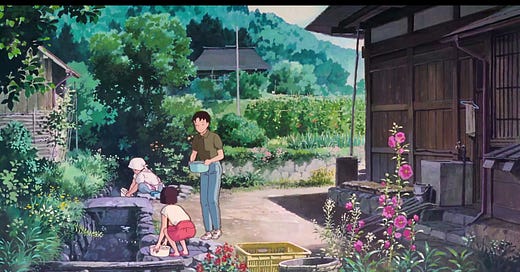What makes a story resonate so deeply with people?
A reflection inspired by the movie Only Yesterday from Studio Ghibli
When I sat down to write this newsletter, I didn’t really have a specific topic in mind. But as I thought a bit about what I’ve been up to this past week, I remembered I rewatched Only Yesterday, a Studio Ghibli movie (I’ve honestly lost count of how many times I’ve rewatched some of their movies — Only Yesterday included).
At first, I thought about writing specifically about the movie. Then I second-guessed myself... I’m not an animator, so who am I to analyze an animated film in depth? But the truth is, Studio Ghibli films are a big source of inspiration for me, both for illustration and storytelling.
Whenever I want to watch something that feels cozy and comforting, I usually end up rewatching a Ghibli film. I say “rewatching” because I’ve seen them all — except for the 3D one, which I still refuse to watch 😅.
While some Ghibli films are pretty well known and even won Oscars, like Spirited Away and The Boy and the Heron, I feel like others are underrated, like Only Yesterday and Whisper of the Heart.
A bit of context
Only Yesterday tells the story of Taeko, a woman in her late twenties who is, for the second time, traveling to a rural farm in Japan to help with the safflower harvest during her vacation from work in Tokyo. The farm belongs to her sister’s in-laws.
On her way to the countryside, Taeko starts remembering episodes from her childhood — when she was around 10 years old. She recalls things like struggling with math and being pressured by her mom and sisters, her first crush, trying pineapple for the first time (which was an exotic fruit for her family), being told "no" by her dad about a dream she later realized wasn't even that big of a dream — and many other memories.
During her stay in the countryside, she starts realizing she actually enjoys being there, and the city life doesn’t make as much sense to her anymore. Sure, she romanticizes rural life a bit, but she just doesn’t feel happy in the city.
What makes us connect to a story?
This film really hits home for me because I also have this deep longing to live in the countryside. I often feel like I’m not truly free in the city. The ironic part? I was born and raised in the countryside — but at some point, I decided to try my luck in the city. My situation at the time, along with the things I didn’t want for myself, led me to make that move.
But now, I picture myself going back. Living in a house with at least a small yard so I can grow a garden — maybe even a bigger space where I could plant more things.
I think that’s why I connect so deeply with this movie. The nostalgia it brings mirrors the kind I carry with me. I romanticize rural life too — even though I know the reality of it. But knowing both the realities of city and countryside life, I still lean toward the latter.
On top of all that, it’s just breathtaking to see the safflower fields and the Japanese countryside beautifully illustrated and animated. Honestly, sometimes I’d forget to follow the dialogue because I was so distracted by all the little visual details in the scenes.
Quick side note:
If you're interested in rural life in Japan, you might enjoy this video I started watching this week. It shows what a small town in Japan looks like:
As you can probably tell, I’m pretty into Japan — from its culture and landscapes to its architecture and beliefs.
At this point, you can still be asking why we connect with stories.
It’s often because we see ourselves in the characters, or we’ve gone through something similar. But that alone isn’t enough. The story also has to be well told — we need to understand the characters' emotions and thoughts, and their decisions and motivations have to feel real.
For me, it’s crystal clear why I see myself in Taeko. Even though we grew up in different places, we both have this desire to leave the city behind and find peace in a simpler, quieter life. And how childhood memories continue to shape us — reminding us of who we were, how we reacted, and how that influences who we are today.
Another aspect why I like Only Yesterday is that Ghibli films have a different storytelling than we are used to in the West. It’s not always that typical hero’s journey arc. In Only Yesterday, there is a conflict, but it’s internal. And we don’t even really know if things end happily ever after the end — we don’t know if Taeko truly enjoyed her decision, what happened to her job in the city, or if she actually married Toshio.
One last thing I really love about Ghibli films is the contemplative moments. There are scenes that exist just for you to take in the landscape and have a moment to breathe and reflect on what you’re seeing.
So, that’s it for this week’s newsletter. It’s a bit different from usual, but I hope it was a nice read.
See you next time!
Charlene ⭐






